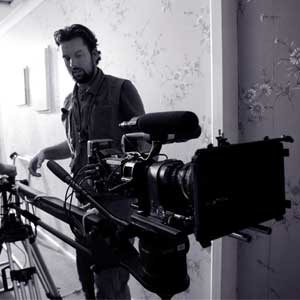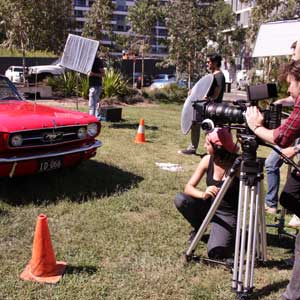Produce your own small budget feature
Let’s be realistic for a moment; you can’t expect to leave any film school and go straight into a job on a multi- million, blockbuster film. As much as we wish this was true, it’s not. So instead, we’ve put together some tips that AFTT’s head of Film Peter Millynn gives his students about producing a great feature on a small budget.
 Make the script to fit your budget
Make the script to fit your budget
Be ambitious, be daring but be realistic. It is all well and good wanting to make a film crammed with car chases and special effects but if you can’t afford it, it’s probably not going to happen. A great script is a great start for a great film but keep in mind that your film will be competing with Hollywood Blockbusters. Think about where your film fits within other movies out there.
Make something that you can finish and be proud of.
Plan!
As with any big project, careful planning is vital. You not only need to plan timing and shooting, but planning spending is, on a micro budget, the most important things to consider. You should make sure that every dollar ends up on screen. Spend some time making note of EVERYTHING you will need including post production, marketing, festival entry costs, Facebook adverts, a publicist. But don’t forget the smaller things; transporting crew and equipment, catering, make up.
Head of Film at AFTT Peter Millynn says ‘Plan for the unexpected … if you don’t have a Plan B you don’t have a Plan.’
Have a primary location during production
It can really cut into your filming time when you have to spend time bumping in and out and lugging equipment from place to place. Find one setup that is the primary location of your shoot to ease the constraints on not only your time but your spending. Look for a primary location that can cover a number of script locations. Don’t get the wrong idea, we are not saying ONLY shoot in one place, but containing your locations will save you time and money.
Find free locations
Location fees can quickly chew through your budget. There are tons of free locations out there – you just have to work around the constraints. Shoot out in public, walking along the sidewalk, in old garages or warehouses. Shoot in businesses while they are open rather than having to pay them to close their business for the morning.
Make sure you get permission from every location you shoot at. There are of ways to get great locations on a minimal budget.

If it doesn’t look good, don’t bother
With such incredible progress in technology there is no excuse to produce a badly shot film. With the right crew and equipment you can produce amazing visuals on a shoestring. Aim high and work hard to make sure that every frame builds the world of your script. This is where the relationship between the DoP and the Production designer is crucial. Everything in the frame should be telling the audience something about the characters and the story. If you want to be taken seriously as a filmmaker your film needs to be visually exciting.
Sound – it’s half the movie
You can have the most beautifully shot film in history but if you have bad sound it will compromise your work. Spend time and money making sure you get great location sound. You can’t fix everything in post. Great post sound design and production will bring the audience into the world of your film. Bad sound just makes it harder for them to engage with character and plot.
Make it sound as good as it looks.
Be a problem solver
At the most basic level Producing is problem solving. On a micro budget shoot you have to think outside of the box. There are so many inventive ways to solve production problems that don’t involve throwing money at them. This is also true for the members of your crew. Your crew will all have different skills and experience … make the most of their input. Be open. Consider all options.
You want to assemble a team that who capable of working on small budgets and understand and embrace working with limitations.
You might not always be able to do it solo
Along with your crew you’ll be able to figure out and perform most functions of filmmaking. Sometimes though you’ll need to accept that you need an expert. Whether that’s an armourer, stunt performer, accountant or a lawyer there are some parts of the process that you have to make sure are done properly to ensure a smooth ride for everyone involved. A meeting with a lawyer may well be a cheaper option than having to recut or reshoot part of the project or even abandon it due to a legal issue.
Immerse yourself in the practical skills of filmmaking, from concept generation to title design here at AFTT. Find out more about studying Screenwriting, Directing and Producing, or Enquire now!